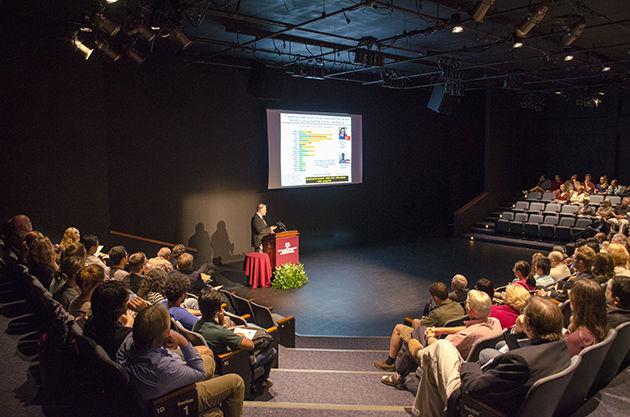Precision medical research is all about finding ways to tailor medicine to specific diseases. Collaborative functional studies supported by the Institute for Advanced Study at A&M are paving the way for this new knowledge.
Dr. Richard A. Gibbs gave a presentation over precision medicine on Monday as a part of the Eminent Scholar Lecture Series. Gibbs said this research has been used for many years to try to explain both pediatric disorders and the common adult diseases that cause most mortality.
“That’s kind of the basic idea of precision medicine, for health. If you could take your DNA sequence and predict your health outcomes, your problems, and your solutions that would be a big help,” Gibbs said.
This presentation was aimed at experienced professionals in this industry and biology majors. Even so, freshman business major Kathryn Pham said the lecture was fascinating and taught her a lot.
“If I hadn’t gone to his previous seminar I would not of understood anything,” Pham said. “The concept itself is fascinating, because eventually how it’s going to go is each of us is going to get a DNA card. … You will get your own tailored medical research.”
Gibbs gave the audience insight into his personal ties to precision medical research. With Gibbs’ help, his grandniece was successfully diagnosed with Xia-Gibbs Syndrome, also known as AHDC1. With his research he is currently aware that this syndrome affects up to 5,000 children today. Sophomore math major Jack Shirley said this part of the research interested him the most.
“It’s pretty interesting how rare some of these mutations are and how he was trying to get families to connect to this information,” Shirley said.
Gibbs received his doctorate from the University of Melbourne then moved to Texas and established the Baylor College of Medicine’s Human Genome Sequencing Center. Gibbs’ current research is focused on the genomics of cancer, heart disease, and autism.
“I always found genetics to be exciting and DNA work even more so, it’s the fundamentals of genetics,” Gibbs said. “Because once you understand the blueprint and how genes work and how variation in genes work then you’ve really got a chance of understanding how cells are made. Once you understand how cells are made you understand how organisms are made and that’s really understanding a lot about life.”
The concept of precision medical research is new yet has accomplished biological milestones. The data and samples contracted by researchers such as Gibbs has accumulated to show obvious signs of scientific advancement. According to Gibbs, the steps to achieving precision medicine are complicated.
“To fix something, first you gotta understand it,” Gibbs said. “That’s finding the gene. Before you even understand it you have to describe it; that’s like sequencing all the people who have it and don’t have it. But the idea is once you understand it you can have a rational design solution.”
Precision medical research is over forty years in the making and Gibbs said it should come to it’s peak in within the next five years. Once precision medicine is perfected it will be able to predict genetic mutations that pass down diseases such as cancer.
“The term end goal is to make us all healthier, the far distant goal is to explain how we work in it’s entirety,” Gibbs said.
Freshman biology major Andrew Talcott said precision medicine can help improve modern medicine.
“It is about precision medicine, it’s about how you can look at the genome in different people in the genetic structure and their phenotypes and tailor medication to that specific process. It could help streamline the process of modern medicine, make it easier, make it faster, and a better experience overall for the patient,” Talcott said.
The presentation sparked debate among the public over whether or not legislation should be passed in order to protect patients from their own genetic sequencing once precision medicine becomes more common. Talcott said he understands the controversy since he believes having so much information about one’s genetics can be a lot to handle.
“I think there is a lot of controversy surrounding precision medical research,” Talcott said. “If you go to the doctor and get a full genetic makeup, do you really want to know some of the traits you can pass down? It’s a very scary feeling knowing that if you bring a child into this world they could potentially have that, you can’t do anything to stop that because it’s part of your genetic code.”
During the presentation Gibbs touched on the personal and legal aspect of retrieving data from patients. HIPAA is a federal law that mainly focuses on protecting the confidentiality and security of healthcare information. This act can help the public but also hurt researchers such as Gibbs. According to Gibbs there is a fine line of what they can use within their research and what is protected by HIPAA.
Some feel that informing someone of their genetic mutation crosses a personal line. Talcott said there is a balancing act at play when considering this issue.
“In some ways, ignorance is bliss, it has to be a balance between a person’s rights and what is medically ethical,” Talcott said.
However, there is also the argument that favors the researchers. If the patient is carrying a life changing disease, they will end up knowing about it through passing their genetics to their children. Therefore, by telling the patient about their genetic mutation, doctors will be able to educate patients about possible outcomes and possibly prevent diseases such as cancer and diabetes. Pham said there is no harm in relaying information to the patient.
“You’re just giving people knowledge, it’s up to them what they do with that knowledge, the other way would be withholding information and what if people honestly do want to know what their future holds,” Pham said.
























